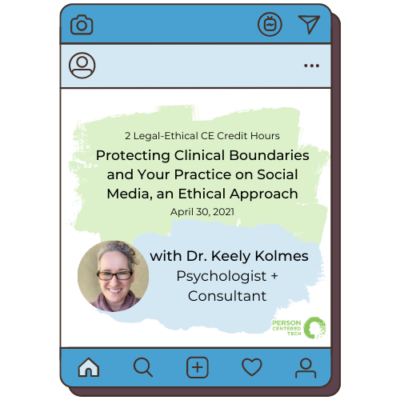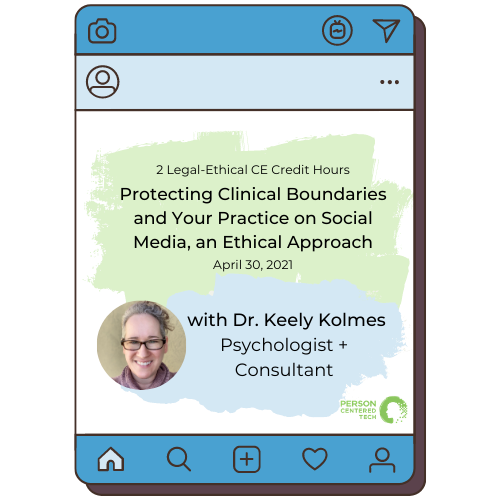Protecting Clinical Boundaries and Your Practice on Social Media, an Ethical Approach
2 CE Credit Hours. Legal-Ethical. Continuing Education Session Replay
Presented By: Keely Kolmes, PsyD
Course Description

Everyone is on social media, love it or hate it.
Clinicians frequently use social media for everything from connecting with family to consulting with professional colleagues. Some clinicians even have a Web presence for non-therapy work, such as creative or performance personas, craft businesses, and much, much, more.The program is intended for Counselors, Clinical Social Workers, Marriage and Family Therapists, and Psychologists in both solo and group practice.Join us as highly lauded social media ethics expert, Dr. Keely Kolmes, teaches about maintaining ethical professional boundaries in the highly porous world of social media.Within this 2 CE credit hour course, you’ll learn:
- How to Identify Common Pitfalls: Identify the ethical challenges that may arise from engaging in activities on the Internet.
- Discuss Online Boundaries: Describe the research that has been done on clients and psychotherapists finding one another’s information online.
- Establish Practical Guidance: Consider how a social media policy can address potential boundary issues with clients and be able to craft one so that these issues can be addressed as part of informed consent.This event features a handout from Dr. Kolmes to help get clinicians started in their processes.
Educational Objectives
- Identify the ethical challenges that may arise from engaging in activities on the Internet.
- Describe the research that has been done on clients and psychotherapists finding one another’s information online.
- Consider how a social media policy can address potential boundary issues with clients and be able to craft one so that these issues can be addressed as part of informed consent.
Syllabus
- Google searches on self
- Who is looking for us?
- Setting up Google Alerts
- Removing self from sites or Google index
- Correcting misinformation
- Various approaches to managing your online presence
- Summary of research on psychotherapists seeking patient information online
- Summary of research on psychotherapy patients seeking information about their mental health provider online
- Research on online reviews and their impact on psychotherapy clients
4. General privacy tips
- What is a policy?
- Why use one?
- What should it include?
- Free copy of Dr. Kolmes’s original SMP
- List of Ethics Codes applied today
- What is Digital Ethics?
- Vignettes: Eight vignettes covering viewing client social media profiles, status updates, handling friend/contact requests, media and public statements, seeking consultation and listserv referrals, managing online reviews, managing multiple professions & social media marketing, retention and documentation of messages on social media
References
- American Association for Marriage and Family Therapy (2015). Code of Ethics. Retrieved from https://www.aamft.org/Legal_Ethics/Code_of_Ethics.aspx
- American Counseling Association (2014). ACA Code of Ethics. Retrieved from https://www.counseling.org/resources/aca-code-of-ethics.pdf
- American Psychological Association. (2017). Ethical Principles of Psychologists and Code of Conduct. Retrieved from https://www.apa.org/ethics/code/
- Baier, A (2018). The Ethical Implications of Social Media: Issues and Recommendations for Clinical Practice. Ethics & Behavior, 29(5)341-351.
- Barnett, Jeffrey E. & Kolmes, Keely. (2016). The practice of tele-mental health: Ethical, legal, and clinical issues for practitioners. Practice Innovations, Vol 1(1), 53-66.
- Barnett, J. E. (2019). The ethical practice of psychotherapy: Clearly within our reach. Psychotherapy, 56(4), 431-440.
- Behnke, Stephen, Ethics in the age of the Internet. APA Monitor on Psychology, July/August 2008, 74-75.
- Blue, V. (2014). Chapter 7: People search websites. In The smart girl’s guide to privacy. (pp. 84-96). Digita Publications Privacy
- Cole, A. (2017). Patient-targeted Googling and psychiatry: A brief review and recommendations in practice. The American Journal of Psychiatry. 11(5). 7-9.
- Dike, C.C., Candilis, P, Kocsis, B., Sidhu, N., & Recupero, P. (2019). Ethical considerations regarding internet searches for patient information. Psychiatric Services. 70(4) 324-328.
- DiLillo, D., & Gale, E. B. (2011). To Google or not to Google: Graduate students’ use of the Internet to access personal information about clients. Training and Education in Professional Psychology, Vol 5(3), 160-166.
- Donner, M., (2007). The Ethical Use of the Listserv: Privacy and Professional Conduct, The California Psychologist, November/December 2007, 22.
- Duncan-Daston, R., Hunter-Sloan, M., & Fullmer, E. (2013). Considering the ethical implications of social media in social work education. Ethics and Information Technology, 15(1), 35–43.
- Fange, L., Mishna, F., Zhang, V. F., Van Wert, M., & Bogo, M. (2014). Social media and social work education: Understanding and dealing with the new digital world. Social Work in Health Care, 53, 800–814.
- Gershenogoren, L. (2019). Patient-targeted googling and psychiatric professionals. The International Journal of Psychiatry in Medicine. 54(2), 133-139.
Presented/Developed By
 Keely Kolmes, Psy.D. is a licensed psychologist in private practice in San Francisco, CA. They served for six years on the California Psychological Association’s Ethics Committee, ending their term as Chair. They also were elected twice as CPA’s Council Representative on APA’s Council. They are a Fellow of APA Division 42, Psychologists in Independent Practice. Dr. Kolmes writes, does research, and provides consultation and training on clinical and ethical issues related to social networking and technology. Their Private Practice Social Media Policy has been cited and adapted internationally. They have published a New York Times Op-Ed on the challenge of consumer reviews of mental health services. They have also been quoted in The Washington Post, Forbes.com, HuffPost Live, and BBC News on issues related to the Internet, ethics, and clinical practice.
Keely Kolmes, Psy.D. is a licensed psychologist in private practice in San Francisco, CA. They served for six years on the California Psychological Association’s Ethics Committee, ending their term as Chair. They also were elected twice as CPA’s Council Representative on APA’s Council. They are a Fellow of APA Division 42, Psychologists in Independent Practice. Dr. Kolmes writes, does research, and provides consultation and training on clinical and ethical issues related to social networking and technology. Their Private Practice Social Media Policy has been cited and adapted internationally. They have published a New York Times Op-Ed on the challenge of consumer reviews of mental health services. They have also been quoted in The Washington Post, Forbes.com, HuffPost Live, and BBC News on issues related to the Internet, ethics, and clinical practice.
Program Notices
Accuracy, Utility, and Risks Statement: None.
Conflicts of Interest: None reported. Dr. Kolmes may make mention of Getting Better, their post-treatment client satisfaction survey, and their updated social media policy. They also have co-authored a book called The Paper Office for the Digital Age. Obviously, purchase of any of these items would incur a financial benefit to Dr. Kolmes.
Commercial Support: Person Centered Tech Inc. is sponsoring this event and will give a brief commercial presentation during the break.
This course is subject to our cancellation/refund policy and complaint policy.

